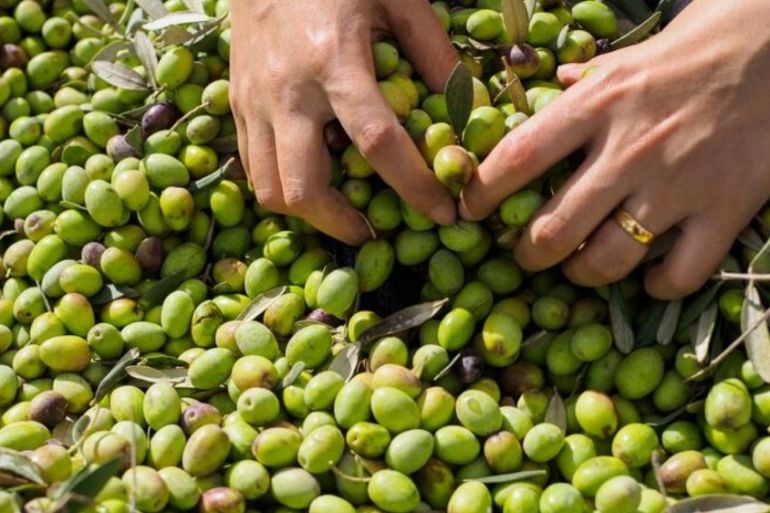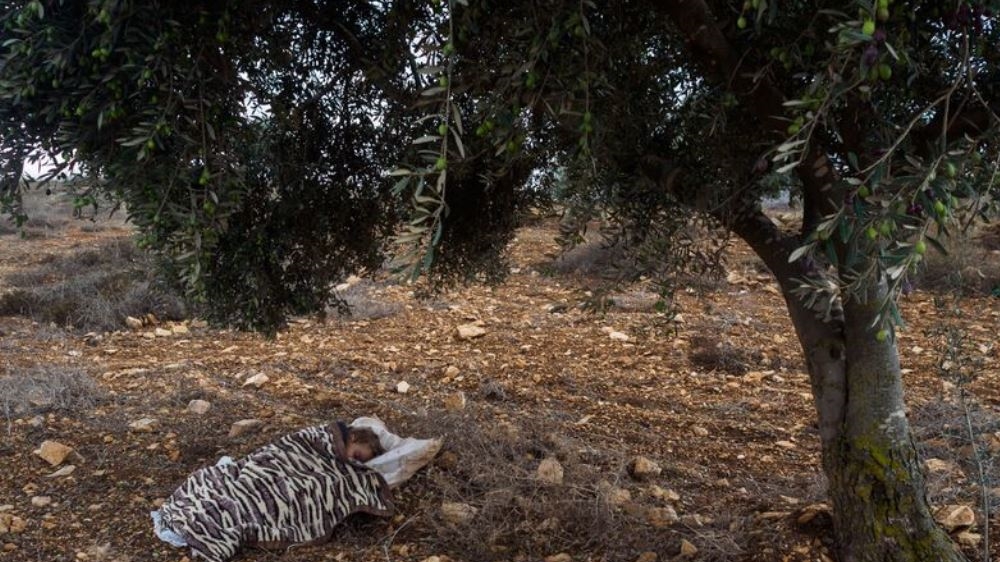Olive harvest in Palestine ‘was very happy time’
Israeli restrictions and failure to investigate crimes against Palestinians mar the olive-picking season.

Turmusaya, Occupied West Bank – The olive harvest season is in full swing across the West Bank.
For Najla Nassan and her six brothers and sisters, it is an occasion to be together. They chat and joke as they comb the olives on to plastic sheets placed on the ground. This afternoon they will take them to the olive press.
Keep reading
list of 4 items‘Grim reminder’: Sri Lanka’s Tamils mark 15 years since end of civil war
Georgia’s president vetoes controversial ‘foreign agents’ bill
‘Regime machinery operating efficiently’ as Tunisia cracks down on dissent
“It’s not a bad season. Not the best, but not bad,” said Nassan. She explained that the trees have produced a great quantity of olives, but that the unusually hot summer this year has made them more watery.
“We’ve been working from 8am, for three days in a row. Today is the last day for us here, and I think we won’t even finish half of the trees, especially with this rain,” she said, pointing to the approaching dark clouds on the horizon. “We would need a minimum two weeks to finish.”
But her family’s land lies in the Ramallah district, between the Palestinian villages of al-Mughayir and Turmusaya, and the illegal Israeli outpost of Adei Ad.
![The olive harvest season started in mid-October and will continue for another few weeks [Lazar Simeonov/Al Jazeera]](/wp-content/uploads/2015/11/969e9016e8a34693ac5bad6b911bae31_18.jpeg)
After the outpost was established in 1998, the Israeli military forbade Palestinians from entering the area surrounding it. Farmers can only access their olive groves after seeking permission from the Israeli Civil Administration, which controls the 60 percent of the West Bank designated as “Area C”.
Israel considers outposts built without government authorisation to be illegal. All settlements are illegal under international law.
“This year we got three days (from the Israeli Civil Administration) during the harvest, and one day in the spring for tilling the soil,” Nassan said.
![Each year, hundreds of international, Palestinian and Israeli volunteers take to the fields to protect farmers from violence by radical settlers [Lazar Simeonov/Al Jazeera]](/wp-content/uploads/2015/11/c9212ba7a940475ab9a89b0b7d87355c_18.jpeg)
The olive harvest season started in mid-October and will continue for another few weeks. Nearly half of the agricultural land in the occupied Palestinian territories is planted with olive trees, and the olive oil industry supports the livelihoods of around 80,000 families.
Each year, hundreds of international, Palestinian and Israeli volunteers take to the fields to help protect farmers from recurring harassment and violence by radical settlers.
Since the beginning of the olive-picking season, an Israeli peace activist named Rabbi Arik Asherman has been attacked and beaten by a knife-wielding masked man in the village of Awarta, near Nablus.
A British man and two Palestinians were wounded while picking olives near Burin.
Olive trees, a symbol of Palestinian culture and steadfastness, have been routinely burned down, uprooted or poisoned. According to the United Nation’s Office for the Coordination of Humanitarian Affairs, Palestinian farmers lose $12.3m in income each year in this way.
In the valleys surrounding the Shilo settlement, Yesh Din, the Israeli watchdog that defends the human rights of Palestinians, documented 50 such incidents from 2005-15. More than half affected lands belonging to the villages of Turmusaya and al-Mughayir.
“It’s not only about the money,” said Rabah Ali Hazama, 49, from Turmusaya. “It’s about what this tree means. If a tree has been growing for 20 years or more, and suddenly it’s cut down, it can’t be replaced.”
Last year, settlers cut down nearly 300 of the family’s trees. It was the third such attack. The outpost of Adei Ad is partly built on 16 hectares of his family’s private land. An additional 18 hectares of family land is accessible to them only a few days each year.
Cultivating the remaining six hectares remains a challenge due to intimidation and violence. Rabah himself said he was shot by a group of 12 masked “hilltop youth”, as they are known in Israel, last year.
The local village council and Yesh Din have filed a petition asking for the removal of the Adei Ad outpost, which they argue is a “hotbed for criminal activity”, adding that it is built partly on private Palestinian land.
In response, in October Israel disclosed its intention to authorise the settlement alongside four other outposts, which would form a contiguous belt with existing nearby settlements. In Adei Ad, a few permanent, red-roofed homes have already popped up alongside white caravans.

Rabah’s 75-year-old uncle Mahmoud Hazama keeps a cabinet full of meticulously catalogued folders that document each police complaint he has filed since 1992.
The folders contain 85 cases, including reports of damage to his trees and property, land confiscation and an attack in which he was beaten and left blind in one eye. He said that in none of these cases was the perpetrator brought to justice.
Each file contains every shred of evidence he could collect, including photographs, original police statements, and supporting evidence from independent bodies.
According to Yesh Din, the Israeli district police in the West Bank systematically fails to investigate 90 percent of ideologically motivated crimes perpetrated by Israeli citizens against Palestinians. Most cases are closed due to “offender unknown” or “insufficient evidence”.
“They do not look for enough evidence. They open the file, and that’s it,” Eyal Hareuveni, a Yesh Din researcher, told Al Jazeera. “When it comes to cutting trees, it is something that takes hours and a large amount of people with noisy chainsaws.”
This impunity, according to the group, has emboldened settlers to carry out attacks in Palestinian communities. The number of such attacks has doubled compared with the previous year.
After the firebomb attack in July on the home of the Dawabshe family in Duma, which killed a child and his parents, Adei Ad was one of the outposts raided by the Israeli police, who arrested two suspects. As yet no one has been be brought to justice for the arson attack.
“The harvest used to be a big occasion,” recalled Mahmoud Hazama. “All the families – from Duma, al-Mughayir, Nablus – would come and help us, then we would go help them. It was a very happy time.”
When asked why he continues to log the incidents, Mahmoud explained: “I need this information for me, for my family, for the future. If someone asks, it is all here.”
![Close to half of the agricultural land in the occupied Palestinian territories is planted with olive trees [Lazar Simeonov/Al Jazeera]](/wp-content/uploads/2015/11/33ad81a328934409a43056ebe2f50b5f_18.jpeg)